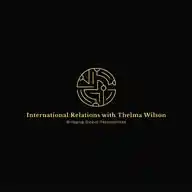
Mzingeli Publications
62 subscribers
About Mzingeli Publications
Mzingeli Publications WhatsApp Channel Description Welcome to Mzingeli Publications! Dive into rich, thought-provoking articles exploring the cultural, historical, and societal dynamics of Mthwakazi and beyond. 📖 What to Expect: In-depth historical accounts, such as the genesis of Mthwakazi and its cultural significance. Explorations of identity and heritage through lenses of unity, diversity, and empowerment. Balanced perspectives on cultural revival and its role in modern challenges. Insights into traditional leadership and its apolitical essence in fostering community resilience. 🌍 Our Focus: Celebrating Mthwakazi’s legacy, amplifying diverse voices, and fostering a deeper understanding of cultural preservation and its relevance in today’s world. Join us for stories that inspire, inform, and connect! ✨ "I write what I want..." (Steve Biko) #heritage #mthwakazi #culturalrevival #unityindiversity
Similar Channels
Swipe to see more
Posts

By okaMzingeli *Mthwakazi: The Rebirth of a Nation - The Journey of a Seven-Year-Old Dream* *The Call of a Nation* Seven years ago, a historic call echoed through the heart of Matabeleland. It was more than an invitation to witness the installation of a Ndebele King—it was a rallying cry for the rebirth of a nation, Mthwakazi. This wasn’t just about crowning a monarch; it was a declaration of cultural identity, a restoration of dignity, and an assertion of a history that refused to be forgotten. The monumental event was scheduled for the 3rd of March, 2018, at the iconic eMagumeni, Barbourfields Stadium in Bulawayo, aptly named the City of Kings. This was not a hastily arranged ceremony but the culmination of an extensive consultative process involving the Khumalo Royal Family, the Crown Council led by traditional chiefs, and the Government of Zimbabwe. By mid-2017, after thorough deliberations, the date was set, igniting hope and anticipation across Matabeleland and beyond. For many, it signified the long-awaited restoration of the Ndebele monarchy, an institution deeply woven into the cultural and historical fabric of the region. *A Twist of Fate* However, fate had other plans. Zimbabwe's political landscape underwent a seismic shift in November 2017 with the sudden rise of a new administration. The transition, marked by both hope and uncertainty, cast a shadow over the planned coronation. As the 3rd of March 2018 approached, the new government—still finding its footing—abruptly cancelled the event, citing the absence of constitutional provisions for a monarchy in Zimbabwe. The cancellation was not just an administrative decision; it was a forceful suppression. Riot police were deployed to enforce the ban, sealing off the stadium and sparking dramatic confrontations in the streets of Bulawayo. The city, once poised to celebrate its royal heritage, became a stage for chaos and defiance. The images of heavily armed security forces clashing with determined cultural revivalists painted a stark picture of a nation grappling with its identity. The aftermath led to legal battles, with both sides presenting their cases in court. The matter eventually landed before Justice Makonese, whose reserved judgment symbolized the unresolved tension between tradition and modern statehood. *The Seven-Year-Old Dream: Growing with a Nation's Aspirations* Now, seven years later, the spirit of that day lives on—resilient, undeterred, and growing stronger. The vision of Mthwakazi, much like a seven-year-old child, has matured with time. This child, born from the hopes of a people yearning for cultural restoration, carries within them the dreams, struggles, and aspirations of an entire nation. The memories of the thwarted coronation remain vivid, etched in the collective consciousness of those who yearned to witness the restoration of their kingdom. Yet, despite the setbacks, the determination to realize this dream has never waned. The proponents of Mthwakazi continue to engage with the political establishment in Harare, navigating complex negotiations that often seem promising before collapsing, only to require renewed efforts from the drawing board. The man destined to ascend the throne on that fateful day, HRM Bulelani Lobengula KaMzilikazi, has grown in both wisdom and stature, mirroring the rise of the Mthwakazi movement itself. What began as a modest gathering of fewer than fifty dedicated amabutho (warriors) has expanded into a formidable force of over 5,000 able-bodied men, united by a common cause. This remarkable growth echoes historical accounts from the 1820s when missionary Robert Moffat visited King Mzilikazi at one of his capitals, Mhlahlandlela, then located around present-day Gauteng, South Africa. Moffat recorded encountering a few thousand warriors during his first visit, only to return years later to find the king commanding an impressive force of over 20,000 brave warriors. *The Cultural Revival: A Growing Legacy* In recent years, the cultural revival of the Ndebele nation has sparked spirited discussions across Zimbabwe and beyond. Central to this renaissance is the annual commemoration of King Mzilikazi Day, held every September at the historic Old Mhlahlandlela site near Bulawayo. The event, with its dazzling displays of amabutho in full regalia, has captured widespread attention. Each chant, dance, and traditional salute reverberates with the echoes of a proud history, reminding all who witness it that Mthwakazi is not a forgotten relic but a living legacy. Like the seven-year-old child, this cultural revival grows stronger each year, fueled by the determination to preserve identity and heritage. It is not merely about remembering the past but about building a future grounded in the values, customs, and traditions that define a people. To fully appreciate the essence of this movement, it is important to separate the restoration of traditional Ndebele leadership from any accusations of political subversion. At its core, the revival is about cultural preservation, unity, and empowerment—offering tangible benefits to Mthwakazi society, the Zimbabwean nation, and the broader Southern African Development Community (SADC). *A Solution to Modern Challenges* The restoration agenda extends beyond pageantry. It encompasses practical initiatives aimed at addressing contemporary issues. For instance, training programs for young Ndebele maidens emphasize preserving cultural values as a direct response to the HIV/AIDS crisis devastating the region. By grounding such interventions in cultural practices, the Ndebele nation demonstrates how traditional leadership can provide solutions to modern challenges. Moreover, traditional leadership offers a platform for political neutrality and unity. Zimbabwe is one of the most politically polarized nations in the region, where citizens often struggle to reconcile divergent political views. Under the stewardship of traditional leaders, communities have been able to coexist peacefully, united by shared cultural values rather than divided by party politics. This approach has proven effective in fostering social cohesion. Traditional leaders, respected across political and social divides, act as custodians of peace, mediators in conflicts, and advocates for community development. Their influence extends beyond ceremonial roles, playing an active part in shaping the moral and ethical foundations of society. *Mthwakazi in the Modern Context* In the modern era, where globalization and rapid technological advancements often overshadow indigenous cultures, the Mthwakazi movement serves as a beacon of identity and pride. It reminds the world that cultural heritage is not a hindrance to progress but a foundation upon which vibrant, dynamic societies are built. The resurgence of interest in Ndebele language, arts, and traditional practices is a testament to this. Schools across Matabeleland are incorporating Ndebele history into their curricula, ensuring that future generations understand and appreciate their roots. Cultural festivals, art exhibitions, and academic conferences dedicated to Ndebele heritage are on the rise, both within Zimbabwe and in the diaspora. Furthermore, the Mthwakazi movement has inspired a sense of entrepreneurship and innovation rooted in cultural pride. Young people are establishing businesses that promote traditional crafts, fashion, and cuisine, blending the old with the new in creative ways. This cultural economy not only preserves heritage but also contributes to economic development. *Conclusion: The Future of Mthwakazi, beyond the seven years* As Mthwakazi marks its seven-year journey since that pivotal call to restoration, it stands as more than just a movement; it is a testament to the enduring spirit of a people. Like a seven-year-old child, it has faced challenges, stumbled, learned, and grown. Its heartbeat echoes in the songs sung at commemorations, in the determined voices of its advocates, and in the quiet pride of those who carry its name in their hearts. The dream of Mthwakazi is not confined to a single event or a coronation. It is a living, breathing journey of cultural revival, social cohesion, and national pride. The future holds both challenges and opportunities, but with the resilience shown over the past seven years, there is no doubt that Mthwakazi will continue to grow, thrive, and inspire. For those who doubted its existence, the message is clear: Mthwakazi is not an aspiration waiting to happen—it already exists. It lives in the hearts and minds of AbeThwakazi, in the traditions they uphold, and in the future they are determined to build. The journey continues, and the dream lives on.














